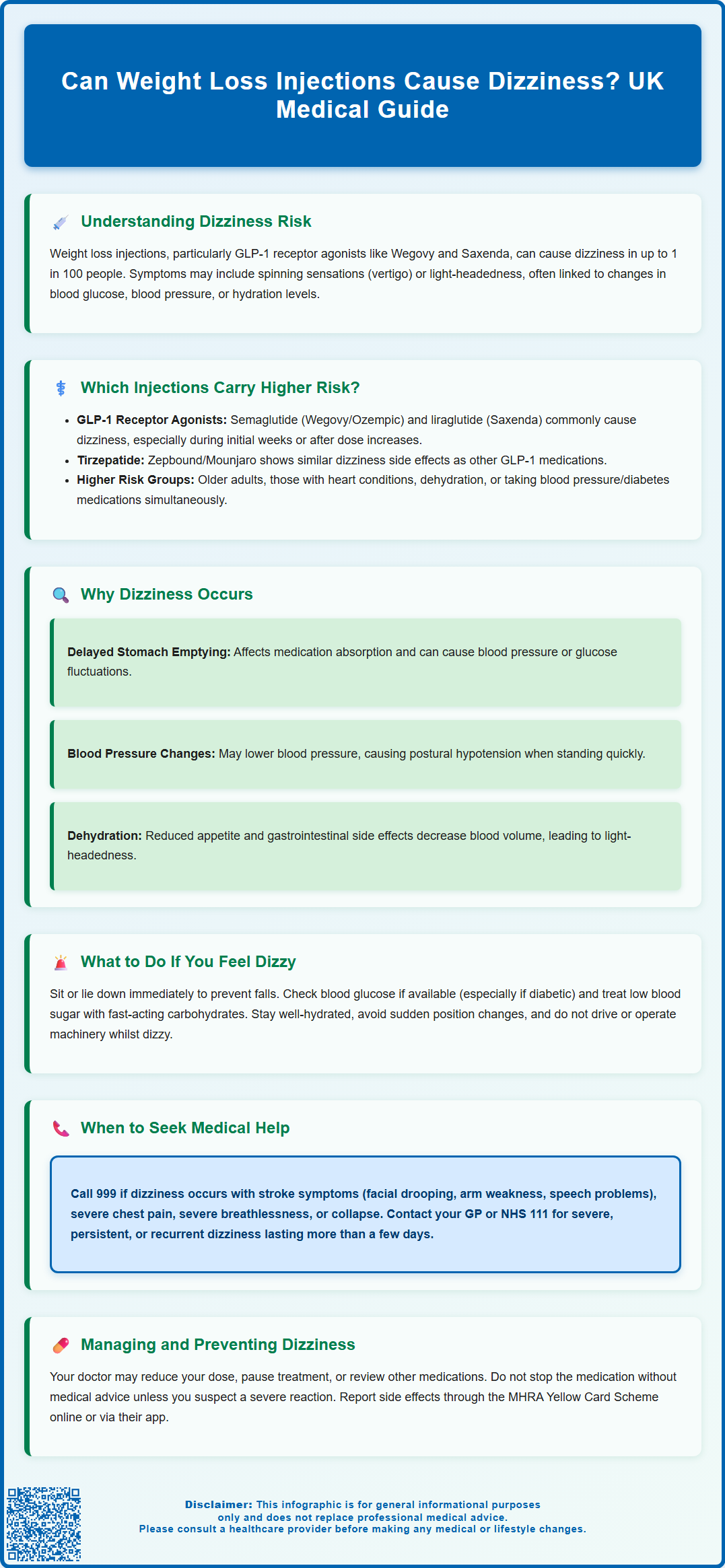Weight loss injections, particularly glucagon-like peptide-1 (GLP-1) receptor agonists such as semaglutide (Wegovy) and liraglutide (Saxenda), can cause dizziness in some individuals. Whilst not experienced by everyone, dizziness is recognised as an uncommon side effect, affecting up to 1 in 100 people according to Medicines and Healthcare products Regulatory Agency (MHRA) approved product information. The symptom may relate to changes in blood glucose, blood pressure, or hydration status. Understanding why dizziness occurs, which medications are most commonly implicated, and when to seek medical advice is essential for safe and effective weight management. If you experience persistent or severe dizziness whilst using these injections, contact your GP or prescribing clinician promptly.
Summary: Weight loss injections, particularly GLP-1 receptor agonists such as semaglutide and liraglutide, can cause dizziness as an uncommon side effect in up to 1 in 100 people.
- GLP-1 receptor agonists including Wegovy and Saxenda list dizziness as an uncommon side effect according to MHRA-approved product information.
- Dizziness may result from changes in blood glucose levels, blood pressure reductions, dehydration, or delayed gastric emptying caused by these medications.
- Patients with diabetes taking insulin or sulphonylureas alongside GLP-1 agonists face increased risk of hypoglycaemia-related dizziness.
- Persistent or severe dizziness requires medical review and may necessitate dose adjustment or investigation of underlying causes.
- Seek emergency care (call 999) if dizziness accompanies stroke symptoms, severe chest pain, or collapse; contact NHS 111 for concerning but non-emergency symptoms.
Table of Contents
Can Weight Loss Injections Cause Dizziness?
Yes, weight loss injections can cause dizziness in some individuals, though it is not experienced by everyone. Dizziness is recognised as a potential side effect of several prescription weight loss medications, particularly those in the glucagon-like peptide-1 (GLP-1) receptor agonist class, such as semaglutide (Wegovy) and liraglutide (Saxenda).
According to the Medicines and Healthcare products Regulatory Agency (MHRA) approved Summary of Product Characteristics (SmPC), dizziness is listed as an 'uncommon' side effect for Wegovy (affecting up to 1 in 100 people) and for Saxenda. The incidence varies between different formulations and individual patient factors, including dosage, rate of dose escalation, and underlying health conditions.
If you experience persistent or severe dizziness whilst using weight loss injections, it is essential to discuss this with your GP or prescribing clinician, as it may indicate the need for dose adjustment, additional investigation, or consideration of alternative treatment options. Seek urgent medical attention (call 999) if dizziness is accompanied by signs of stroke (facial weakness, arm weakness, slurred speech), severe chest pain, severe shortness of breath, or collapse. Contact NHS 111 if you're unsure about the severity of your symptoms but are concerned.

Which Weight Loss Injections Are Most Likely to Cause Dizziness?
GLP-1 receptor agonists are the weight loss injections most commonly associated with dizziness. This class includes semaglutide (marketed as Wegovy for weight management and Ozempic for type 2 diabetes) and liraglutide (Saxenda).
According to their respective SmPCs, dizziness is classified as an 'uncommon' side effect for both Wegovy and Saxenda, meaning it may affect up to 1 in 100 people. Some patients report light-headedness particularly during the initial weeks of treatment or following dose increases.
Other injectable weight loss medications may also cause dizziness. Tirzepatide (marketed as Zepbound for weight management and Mounjaro for type 2 diabetes in the UK) is a dual GIP/GLP-1 receptor agonist that has shown similar side effect profiles in clinical trials, including reports of dizziness. The frequency appears comparable to other GLP-1 agonists, though longer-term post-marketing data are still accumulating.
It is worth noting that individual susceptibility varies considerably. Factors that may increase the likelihood of experiencing dizziness include:
-
Rapid dose escalation without adequate titration
-
Pre-existing cardiovascular conditions or autonomic dysfunction
-
Concurrent use of medications that lower blood pressure or blood glucose
-
Dehydration or inadequate fluid intake
-
Older age or frailty
Patients with type 2 diabetes using these medications may be at particular risk if they are also taking insulin or sulphonylureas, as the combination can increase the risk of hypoglycaemia, which commonly presents with dizziness or light-headedness. When used alone, GLP-1 receptor agonists rarely cause hypoglycaemia.
What to Do If You Experience Dizziness on Weight Loss Injections
If you develop dizziness whilst taking weight loss injections, do not ignore it. The appropriate response depends on the severity and frequency of symptoms. For mild, occasional dizziness that resolves quickly, simple measures may suffice, but persistent or severe symptoms require medical review.
Immediate steps to take include:
-
Sit or lie down immediately to prevent falls or injury. Dizziness can impair balance and increase the risk of accidents.
-
Check your blood glucose if you have a monitor available, particularly if you have diabetes or are taking other glucose-lowering medications. Hypoglycaemia (low blood sugar) requires prompt treatment with fast-acting carbohydrates such as fruit juice, sugary drinks, or glucose tablets.
-
Ensure adequate hydration. GLP-1 receptor agonists can cause nausea and reduced appetite, which may lead to decreased fluid intake. Dehydration can exacerbate dizziness.
-
Avoid sudden position changes. Stand up slowly from sitting or lying positions, as postural hypotension (a drop in blood pressure upon standing) can be worsened by these medications.
-
Do not drive or operate machinery while experiencing dizziness or after a hypoglycaemic episode until fully recovered.
When to seek medical help:
-
Call 999 immediately if dizziness is accompanied by signs of stroke (facial drooping, arm weakness, speech difficulties), severe chest pain, severe shortness of breath, or collapse
-
Contact your GP urgently or call NHS 111 if:
- Dizziness is severe, persistent, or worsening
- You experience fainting or near-fainting episodes
- Dizziness is accompanied by palpitations or visual disturbances
- You have recurrent episodes that interfere with daily activities
- You suspect hypoglycaemia but symptoms do not resolve with carbohydrate intake
Your clinician may recommend:
-
Temporarily reducing the dose or pausing treatment
-
Reviewing concurrent medications that may contribute to dizziness
-
Investigating underlying causes through blood pressure monitoring, ECG, or blood tests
-
Adjusting the rate of dose escalation
-
Switching to an alternative weight management strategy if symptoms persist
Do not stop your medication without medical advice unless you suspect a severe reaction, in which case stop and seek urgent medical help. NICE guidance on obesity management emphasises the importance of individualised treatment and regular monitoring for adverse effects.
If you believe your dizziness is a side effect of your medication, you can report it through the MHRA Yellow Card Scheme at yellowcard.mhra.gov.uk or via the Yellow Card app.
Why Do Weight Loss Injections Sometimes Cause Dizziness?
The mechanisms underlying dizziness with weight loss injections are multifactorial and relate to both the pharmacological actions of these medications and secondary physiological changes associated with weight loss and reduced caloric intake.
Pharmacological mechanisms:
GLP-1 receptor agonists work by mimicking the action of naturally occurring incretin hormones, which regulate glucose metabolism and appetite. These medications slow gastric emptying, enhance insulin secretion in response to meals, and suppress glucagon release. Delayed gastric emptying can affect the absorption of some oral medications, potentially contributing to fluctuations in blood pressure or glucose levels that manifest as dizziness. The SmPCs for these medications note caution with concomitant medicines that require rapid gastrointestinal absorption.
Cardiovascular effects:
Some patients experience modest reductions in blood pressure whilst taking GLP-1 receptor agonists, which is generally beneficial for cardiovascular health but can occasionally cause postural hypotension or light-headedness, particularly in individuals already taking antihypertensive medications. Heart rate may also be slightly increased in some patients, as noted in the SmPCs, which could contribute to sensations of dizziness or palpitations.
Metabolic factors:
Hypoglycaemia is a consideration, especially in patients with type 2 diabetes taking insulin or sulphonylureas alongside GLP-1 agonists. Low blood glucose commonly presents with dizziness, tremor, sweating, and confusion. When used alone, GLP-1 receptor agonists rarely cause hypoglycaemia in people without diabetes.
Dehydration and reduced oral intake:
The appetite-suppressing effects of these medications, combined with gastrointestinal side effects such as nausea and vomiting, can lead to inadequate fluid and electrolyte intake. Dehydration reduces circulating blood volume, which can cause orthostatic hypotension and dizziness, particularly upon standing.
Individual susceptibility:
Certain patient groups may be more vulnerable to dizziness, including older adults, those with pre-existing autonomic dysfunction, and individuals with cardiovascular disease. Patients with pre-existing balance problems may find symptoms more troublesome. If dizziness persists despite appropriate management strategies, further investigation may be warranted to exclude other causes unrelated to the medication itself.
Frequently Asked Questions
How common is dizziness with weight loss injections?
Dizziness is classified as an uncommon side effect of GLP-1 receptor agonists such as Wegovy and Saxenda, affecting up to 1 in 100 people according to MHRA-approved product information. Individual susceptibility varies based on factors including dosage, concurrent medications, and underlying health conditions.
Should I stop taking my weight loss injection if I feel dizzy?
Do not stop your medication without medical advice unless you suspect a severe reaction. Contact your GP or prescribing clinician to discuss your symptoms, as dose adjustment or further investigation may be needed rather than discontinuation.
Can dehydration from weight loss injections cause dizziness?
Yes, GLP-1 receptor agonists can reduce appetite and cause nausea, leading to decreased fluid intake and dehydration. This reduces circulating blood volume and can cause orthostatic hypotension and dizziness, particularly when standing up.
The health-related content published on this site is based on credible scientific sources and is periodically reviewed to ensure accuracy and relevance. Although we aim to reflect the most current medical knowledge, the material is meant for general education and awareness only.
The information on this site is not a substitute for professional medical advice. For any health concerns, please speak with a qualified medical professional. By using this information, you acknowledge responsibility for any decisions made and understand we are not liable for any consequences that may result.
Heading 1
Heading 2
Heading 3
Heading 4
Heading 5
Heading 6
Lorem ipsum dolor sit amet, consectetur adipiscing elit, sed do eiusmod tempor incididunt ut labore et dolore magna aliqua. Ut enim ad minim veniam, quis nostrud exercitation ullamco laboris nisi ut aliquip ex ea commodo consequat. Duis aute irure dolor in reprehenderit in voluptate velit esse cillum dolore eu fugiat nulla pariatur.
Block quote
Ordered list
- Item 1
- Item 2
- Item 3
Unordered list
- Item A
- Item B
- Item C
Bold text
Emphasis
Superscript
Subscript












